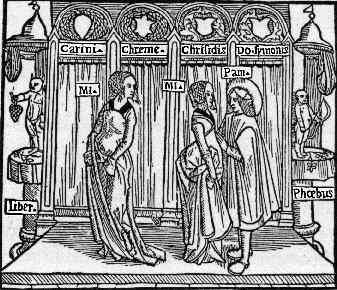Classical comedy
The Latin comedy of Terence and Plautus* was well known to scholars of Renaissance England. Shakespeare would have studied Plautus in particular at grammar school. Both authors based their comedies on the Greek "new comedy" of Menander.
In addition to its disciplined structure, adhering to the three "unities", the plotting of Latin comedy was careful, usually complicated. Young men and women fell in love, had their love thwarted, and, often through the aid of clever servants, eventually triumphed over adversity by some form of clever manipulation or disguise.
(More on the next screen.)
A renaissance staging of Terence
The woodcut, from a 1493 edition of the plays of Terence, gives some idea of the way his plays were staged in the universities. The play is the Eunuchus, used as a source for The Comedy of Errors by Shakespeare.
Note the resemblance of the central structure to the "house" used in staging at Court, and the use of titles above each of the four doors to indicate what it represents.
Footnotes
-
Plautus
T. Maccius Plautus lived between about 254-184 B.C. His plays were based on Greek comedies, and tended to emphasise farcical and situational humour. Shakespeare's Comedy of Errors is based on comedies by Plautus (see the next page).
